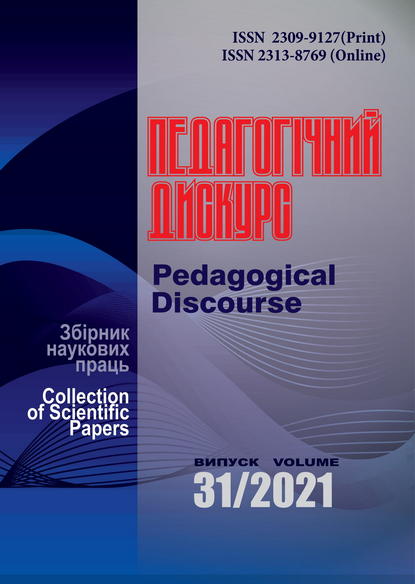Social and Pedagogical Actualities of Training of Future Physical Training Teachers for Organizing Individual Work with Pupils
Abstract
The article theoretically analyses the essence of the problem of social and pedagogical actualities of training of future physical training teachers for organizing individual work with pupils. It has been emphasized that improving and modernization of physical education in secondary school takes into account traditional approaches to physical education of the younger generation. It has been found that nowadays, in physical education and sports education there is a reorientation of the target settings of learning to achieve the norms of physical fitness that correspond to the age of pupils, as a result of increasing the quality of personal development of each pupil. There is a borrowing of new concepts by teachers of physical training, advanced pedagogical experience, taking into account the requirements of the state, outlined in the legislative documents. The results of comparative analysis of scientific sources of modern scholars, where various aspects of vocational training of future physical training teachers are revealed, have been presented. General tendencies and approaches, features and contradictions have been found; social and pedagogical actualities of vocational training of future physical training teachers for organizing individual work with pupils have been concretized. It has been generalized that changes in sociocultural situation and content of pedagogical education determine the directions of improvement, functioning and development of future qualified teacher of physical training. Observation of the work of practicing physical training teachers allowed us to conclude that the actualization in public opinion of the idea of developing a culture of healthy and safe lifestyle of pupils as a strategic resource of individual and social development directs the educational community to find ways to improve physical education of schoolchildren. There is a suggestion that the conditions and factors for optimizing the vocational training of students who receive higher education in the field of educational activities in the specialties 014.11 Secondary education (Physical Training) and 017 Physical Training and Sports; build promising trajectories of the forecast of achievement of the outlined targets.
Downloads
References
Antonov, О. V. (2014). Rozvytok rukhovykh yakostei starshoklasnykiv na zaniattiakh z pishokhidnoho turyzmu u pozashkilnykh navchalnykh zakladakh [Development of Motor Skills of Senior Pupils in Hiking Classes in Out-of-School Educational Institutions]. (Abstract of Candidate’s dissertation). Luhansk [in Ukrainian].
Bezverkhnia, H. V. (2003). Motyvatsiia do zaniat fizychnoiu kulturoiu i sportom shkoliariv 5–11 klasiv [Motivation for Classes on Physical Training and Sports of Schoolchildren of 5-11 Grades]. (Abstract of Candidate’s dissertation). Uman [in Ukrainian].
Belyaeva, P. I. (2014). Psihologicheskaya bezopasnost lichnosti mladshego shkolnika v obrazovantelnoy srede shkoly [Psychological Safety of the Personality of Junior Schoolchild in the Educational Environment of School]. (Abstract of Candidate’s dissertation). Saint Petersburg [in Russian].
Harkusha, S. V. (2013). Kharakterystyka stanu zdorovia suchasnoi molodi v Ukraini [Description of the State of Health of Modern Youth in Ukraine]. Visnyk Chernihivskoho natsionalnoho pedahohichnoho universytetu imeni T. H. Shevchenka. Seriia: Pedahohichni nauky. Fizychne vykhovannia i sport – Bulletin of the T. H. Shevchenko Chernihiv National Pedagogical University. Series: Pedagogical sciences. Physical Education and Sport, 107 (1), 92–95 [in Ukrainian].
Hauriak, О. D., & Kyselytsia, О. М. (2012). Formuvannia pedahohichnoi kultury v protsesi fakhovoi pidhotovky u VNZ [Formation of Pedagogical Culture of Future Physical Training Teachers in the Process of Vocational Training in the Higher Educational Institution]. Visnyk Zaporizkoho natsionalnoho universytetu. Seriia: Fizychne vykhovannia i sport – Bulletin of Zaporizhzhia National University. Series: Physical Education and Sport, 2, 27–35 [in Ukrainian].
Druchyk, V. D. (2017). Pidhotovka maibutnikh uchyteliv fizychnoi kultury do vprovadzhennia zdorovia zberezhuvalnykh tekhnolohii u starshii shkoli [Training of Future Physical Training Teachers for Introduction of Health Saving Technologies at High School]. (Abstract of Candidate’s dissertation). Kyiv [in Ukrainian].
Ivakhno, O. P., Koziarin, І. P., & Niemtsova, Yu. V. (Eds.). (2014). Metody otsinky fizychnoho rozvytku i zdorovia dytiachoho naselennia [Methods of Evaluation of Physical Development and Health of the Child Population]. (2nd ed., rev.). Kyiv: Tsentr DZK [in Ukrainian].
Nevedomska, Ye. O., Marunenko I. M., & Prokopchenko, L.I. (2011). Anatomiia, fiziolohiia, patolohiia ditei z osnovamy henetyky [Anatomy, Physiology, Pathology of Children with Genetics Basics]. Cherkasy: Vyd. vid. ChNU im. B. Khmelnytskoho [in Ukrainian].
Stepin, V. S., Guseynov, A. A., Semigin, G. Yu., & Ogurtsov, A. P. (Eds.). (2010). Novaya filosofskaya entsiklopediya [New philosophical encyclopaedia]. (Vol. 3). Moscow: Mysl [in Russian].
Skrynnyk, Z. Е. (2012). Provedennia indyvidualnoho zaniattia za metodom analizu konkretnykh navchalnykh sytuatsii (case study) [Conducting an Individual Lesson on the Method of Analysis of Specific Learning Situations (Case Study)]. Lviv: LIBS UBS NBU [in Ukrainian].
Biktagirova, G. F., & Kasimova, R. Sh. (2016). Formation of University Students’ Healthy Lifestyle. International Journal of Environmental and Science Education, 11 (6), 1159–1166 [in English].
Block, M. E., Taliaferro, A., & Campbell, A. L. (2011). Teaching the Self-Contained Adapted Physical Education Class. Journal of Physical Education, Recreation & Dance, 4 (82), 47–52 [in English].
Boyce, А. В. (2013). Physical Education – overview, preparation of teachers. Journal of National, Health, Sport, and Programs, 68(4), 25–33 [in English].
Christian, H., Zubrick, S. R., & Foster, S. (2015). The influence of the neighborhood physical environment on early child health and development: A review and call for research. Health & Place, 33, 25–36 [in English].
Coates, J. K. (2012). Teaching inclusively: are secondary physical education student teachers sufficiently prepared to teach in inclusive environments? Physical Education and Sport Pedagogy, 4 (17), 349–365 [in English].
Cooper, M. D. (2002). Safety Culture: A model for understanding and quantifying a difficult concept. Professional Safety, 30–36 [in English].
Denisova, V. V. (2012). Social and educational environment as a factor of safety culture teens. Science and Education: materials of the international research and practice conference (pp. 391–395). Gеrmany: «Bildungs zentrum Rodnik e. V.» [in English].
Steinberg, M. P. (2011). Student and Teacher Safety in Chicago Public Schools. The Roles of Community Context and School Social Organization. Chicago: University of Chicago [in English].
Copyright (c) 2021 Pedagogical Discourse

This work is licensed under a Creative Commons Attribution-NonCommercial-ShareAlike 4.0 International License.

















